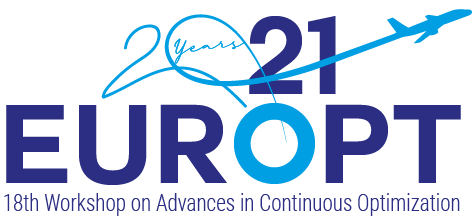WF-05: Multiobjective Optimization: Uncertainty and Nonconvexity
Stream: Multiobjective Optimization
Room: Pontryagin
Chair(s):
Gabriele Eichfelder
A general branch-and-bound framework for global multiobjective optimization
Oliver Stein
We develop a general framework for branch-and-bound methods in multiobjective optimization. Our focus is on natural generalizations of notions and techniques from the single objective case. After a review of the main ideas of single-objective branch-and-bound we discuss the appropriate generalizations of upper and lower bounds, discarding tests, node selection and termination criteria to the multiobjective setting. As a novel tool for multiobjective branch-and-bound we introduce convergent enclosures for the set of nondominated points. Numerical results illustrate our approach.
Extending the Robust (Relative) Regret Approach to a Multicriteria Setting
Patrick Groetzner, Ralf Werner
Consider a multiobjective decision problem with uncertainty given as a set of scenarios. In the single critria case, a famous method is to compare the possible decisions under uncertainty against the optimal decision with the benefit of hindsight, i.e. to minimize the (possibly scaled) regret of not having chosen the optimal decision. In this talk, we extend the concept of regret to the multiobjective setting and introduce a proper definition of multivariate (relative) regret. In contrast to the existing approaches, we are not limited to finite uncertainty sets or interval uncertainty.
Solving uncertain multiobjective optimization problems via epigraphical reformulations
Ernest Quintana, Gabriele Eichfelder
In this talk, we consider a solution approach for set-based robust solutions to multiobjective optimization problems under uncertainty. Specifically, we derive a parametric family of (deterministic) semi-infinite multiobjective problems whose solution sets approximate, with desired accuracy, that of the original problem. The tractability of the semi-infinite constraints is also analyzed with tools of Fenchel duality. Our approach generalizes the standard epigraphical reformulation of robust scalar problems to the multiobjective setting.
A New Directional Derivative for Set Optimization
Gabriele Eichfelder, Robert Baier, Tobias Gerlach
Set-optimization has attracted increasing interest in the last years, as for instance uncertain multiobjective optimization problems lead to such problems with a set-valued objective function. Optimality conditions for these problems, for instance using directional derivatives, are still very limited. The key aspect for a useful directional derivative is the definition of the used set difference. We present a new set difference which avoids the use of a convex hull and which applies to arbitrary convex sets. It is based on the new concept of generalized Steiner sets.
